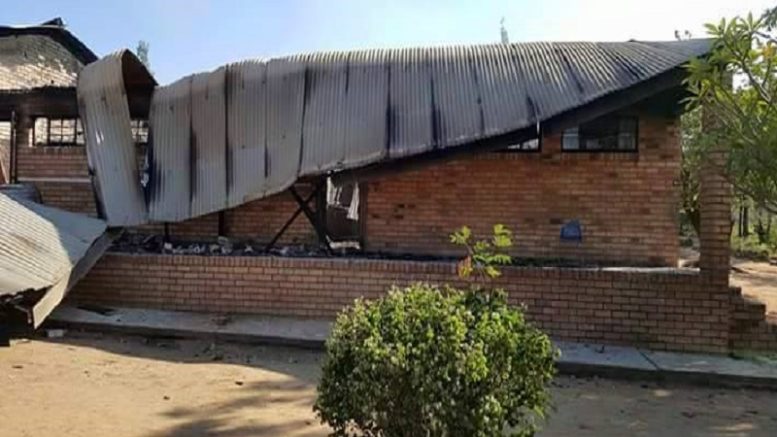 A burning school in Limpopo province
A burning school in Limpopo provinceBy Thursday last week, South African blacks in the country’s northern Limpopo province had destroyed 23 schools, of which 19 were set alight. The burning of schools has always been seen as a legitimate form of protest in South Africa and until the ANC-SA Communist Party takeover in 1994 it was encouraged by liberals. The burning of a school or a university is usually described as an “uprising” which is considered a positive “revolutionary deed”. A few weeks ago a lecture hall at the University of the Witwatersrand in Johannesburg was also set alight.
The current unrest stems from ethnic conflict between the Venda and Tsonga tribes in the Vuwani region. Officially, however, ethnicity does not exist in South Africa, despite the country having eleven official languages. During the days of white rule, care was taken to apportion to each tribe its own territory and institutions, in an effort to minimise so-called “black-on-black violence”. However, the advent of Afro-Marxist rule in 1994, has led to the phenomenon of “dominant tribes” prevalent elsewhere on the African continent, with Xhosas and then Zulus dominating the central government. However, in the northern region of South Africa, the Venda tribe which used to have its own “Republic of Venda” under the apartheid system, is asserting its power over the Tsonga people. Three districts previously under Tsonga control have been incorporated into the Venda-ruled territory, leading to the current rioting and burning of schools, post offices and government buildings.
The tribal nature of the conflict has been carefully edited out of reporting on the school burning. In its report, the BBC plaintively asks, Why are South Africans burning schools in Limpopo? According to the BBC, it may be simply ascribed to “a violent dispute over district boundaries”. In the usual liberal explanation, the violence will be blamed on whites and on “the legacy of apartheid”, whereas the apartheid doctrine of self-determination and home rule for black tribes was actually designed to prevent such violence and rioting, not encourage it!
The burning of schools in Limpopo normally takes place during the night but on Thursday the MariaDze School in Mashau Doli was set alight during daylight hours.

These used to be school desks in a classroom, now burnt out. The desks would have been paid for by ‘racist’ white South African taxpayers or corporations who will once again foot the bill for rebuilding schools.
Some children and residents gathered around the burning school as they watched the administrative building go up in flames.
“I feel bad because more children will not be going to school their future will be destruction,” said one pupil.
“Those who are burning the schools – this is not right because you are burning your future. Your sister or brothers’ future – this is wrong you must stop.”
However, others say it is a good thing and it will make the government sit up and notice. The ruling ANC-South African Communist Party regime has already dispatched the elite police unit, the Hawks, to the area, while the ministers of State of Security and Cooperative Governance have held press conferences in Limpopo.
Many roads in the conflict area have been barricaded with rocks and trees, while elsewhere nails have been strewn on roads to sabotage vehicles.
The town of Malumelele has been incorporated into a new municipality, despite opposition from its residents. This is a normal tactic, as most white Afrikaner towns in the country have also been merged with other municipalities to disenfrachise them completely at the local level. However, while Afrikaners do not burn their own schools as a form of protest, the current unrest is turning into a slight embarassment for the ANC-SACP regime.
Most probably, the schools will be rebuilt and funding will be taken away from majority-white Afrikaans schools to pay for the damages.
In the South African parliament in Cape Town, the Portfolio Committee on Basic Education has “expressed its concern and condemns in the strongest possible terms the burning of schools and infrastructure in Vuwani, Limpopo, during recent protest action”.
Committee Chairperson Ms Nomalungelo Gina said “the community” needs to take cognisance of the education of the learners. “The destruction and burning of state property will not resolve the issue. The only parties that are disadvantaged are the learners who are not receiving teaching at the moment.”
She said the community has every right to protest, but this should not include the destruction of infrastructure. “This is a school term in which all learners will be writing exams and learners need the educational support and teaching they can get. Protesters should be mindful of the effect this will have on Grade 12 learners, who in the next few months will have to sit for their final examinations. Protesters should remember it is their children, cousins and neighbours who will be negatively affected by this action.”
The Committee has urged all interested parties, traditional leaders (tribal chiefs), community leaders, education officials and law enforcement authorities “to speedily reach a solution to address the matter so that the education of these learners can continue”.
S. African blacks continue to burn their own schools in Limpopo province

